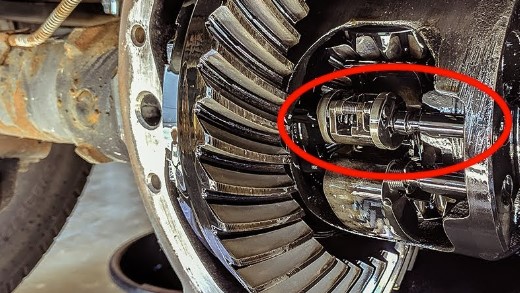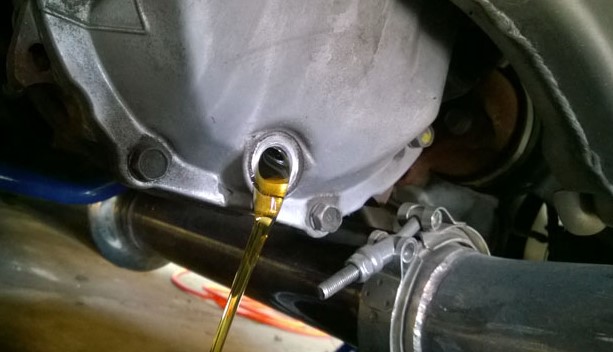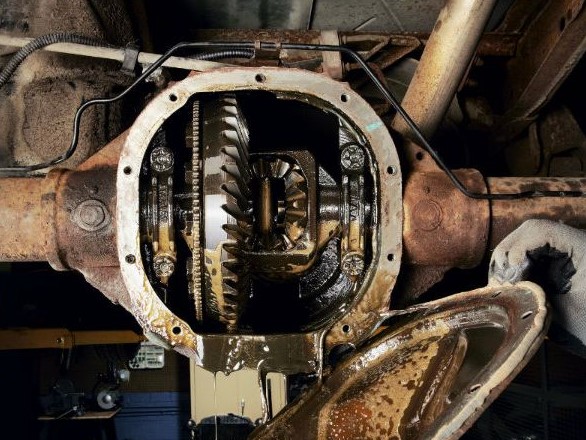Properly maintaining the differential fluid is crucial for a vehicle to run efficiently. Failing to do so can lead to costly repairs and potential damage that could have been avoided. To ensure optimal performance, it is recommended that drivers change their differential fluid at regular intervals as determined by the manufacturer’s specifications. Furthermore, any signs of fluid leakage or other issues should be addressed immediately to avoid further complications.
What Is Differential Fluid?
Differential fluid is an important component of any vehicle’s drivetrain. It is a thicker type of oil that helps to ensure that the gears within the differential are kept lubricated, reducing wear and tear on both these parts and other components in the drivetrain. This protects against excessive friction, leading to costly repairs or even dangerous situations due to mechanical failures.
The importance of using differential fluid lies in its ability to penetrate deep into the gear teeth, increasing their lifespan and creating a more effective seal between them and other components such as bearings or seals. Differential fluids also protect from corrosive elements, extending their service life further while preventing rusting or corrosion-related damage.
What Will Happen If You Never Change Differential Fluid?

Differential fluid or gear oil is essential for correct and efficient functioning. If it is not regularly changed, it can accumulate dirt and debris in the gearbox, which could cause significant wear on the mechanisms within. This, in turn, could result in a decrease in performance, potential damage to other parts of the engine, and, ultimately, higher repair costs. Therefore, regular maintenance that includes changing differential fluid or gear oil when needed is highly recommended for optimal running conditions of any vehicle.
Whining Noise From Transmission Or Differential
The whining noise often heard from the differential or transmission indicates a need for immediate change in the differential fluid. This could be due to a lack of lubrication caused by low fluid levels, or the existing fluid has become too dirty. The sound will usually get louder with increased vehicle speed and should not be ignored since it can cause significant damage if left unchecked.
Transmission Jerking
When behind the wheel, jerking or vibrating the vehicle may indicate something is wrong with the differential. If this occurs, it is possible that the differential oil has not changed and needs to be serviced. As with engine oil, regular maintenance of differential fluid helps prevent transmission jerking and noise that can accompany it. In some cases, however, there may be a more serious issue; if the changing differential fluid does not resolve these symptoms, further inspection should be conducted.
Burning Smell
Differential oil is important in smoothly running a vehicle’s gears and differentials. Keeping this fluid at the correct level is essential for proper functioning. Suppose the differential oil is not changed regularly. In that case, it can cause the gears or differentials to wear off, resulting in strange noises and potentially dangerous overheating that produces a burning smell.
Leaks from seals may also produce an odor when certain oils are released into their surroundings; however, this would be accompanied by an evident reddish stain on the pavement where you park your car. In either case, it is advised that a professional should inspect any suspicious smells as soon as possible to avoid more damaging engine damage or costly repairs down the road.
Worn Out Differential
Regularly changing the differential oil can be critical for vehicle maintenance. Failing to do so could lead to wear and tear on differentials, resulting in several issues, including loud noises and immobility. Regularly inspecting and changing the differential oil can help avoid such complications.
Benefits Of Changing Differential Fluid

Gear fluids are primarily used to lubricate the gear, allowing it to function correctly. The lubrication ensures smooth operation and minimizes wear over time.
- To ensure optimal performance, it is important to keep the differentials cool.
- Maintaining proper lubrication can reduce friction caused by metal-to-metal contact.
- Properly maintained differentials and gears will last longer, thus eliminating costly replacements.
- Smooth operation of gears and differentials is possible with regular maintenance and lubrication.
When the differentials fail to function correctly, this can cause various costly and serious problems.
How Often Should You Change Differential Fluid?
Regularly checking and changing the differential fluid in your vehicle is an important maintenance task to ensure its performance remains optimal. Depending on the make and model of your car, there are different timeframes for when this should be done.
Generally speaking, checking the fluid level and condition after every 30,000-50,000 miles of driving is recommended. If everything functions correctly on inspection, you can continue driving for another 10,000-20,000 miles before needing a change. If not, replacing the fluid sooner rather than later will help maintain your car’s performance.
For specific advice regarding when or how often you need to change your differential fluid and other related service tasks, it would be best to consult the manufacturer or refer to their user manual for detailed guidelines.
Final Words
Regularly changing the differential fluid is essential for a vehicle’s longevity and performance. Failure to do so can lead to major damage, resulting in costly repairs or replacements. Taking the time to check and change this fluid on schedule is highly recommended, as it can save considerable hassle.
